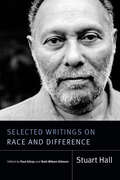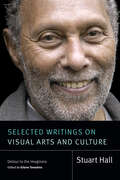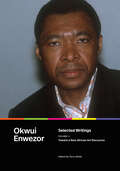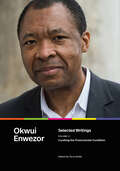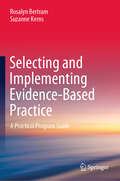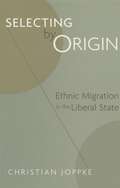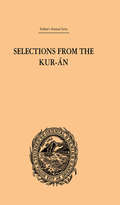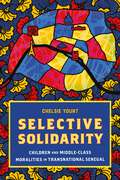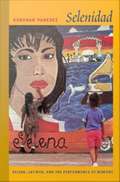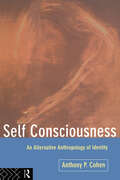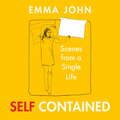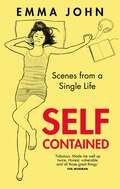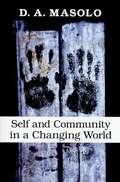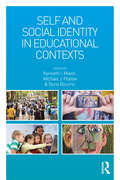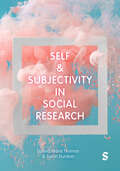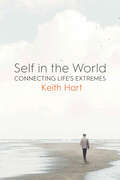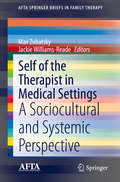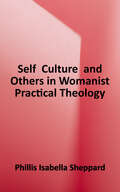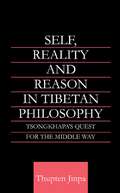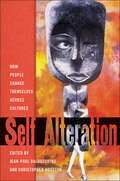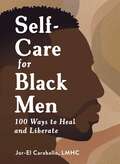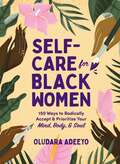- Table View
- List View
Selected Writings on Race and Difference (Stuart Hall: Selected Writings)
by Stuart HallIn Selected Writings on Race and Difference, editors Paul Gilroy and Ruth Wilson Gilmore gather more than twenty essays by Stuart Hall that highlight his extensive and groundbreaking engagement with race, representation, identity, difference, and diaspora. Spanning the whole of his career, this collection includes classic theoretical essays such as “The Whites of Their Eyes” (1981) and “Race, the Floating Signifier” (1997). It also features public lectures, political articles, and popular pieces that circulated in periodicals and newspapers, which demonstrate the breadth and depth of Hall's contribution to public discourses of race. Foregrounding how and why the analysis of race and difference should be concrete and not merely descriptive, this collection gives organizers and students of social theory ways to approach the interconnections of race with culture and consciousness, state and society, policing and freedom.
Selected Writings on Visual Arts and Culture: Detour to the Imaginary (Stuart Hall: Selected Writings)
by Stuart HallStuart Hall’s work on culture, politics, race, and media is familiar to readers throughout the world. Equally important was his decades-long commitment to visual art. As the first collection to bring together Hall’s work on the visual, this volume assembles two dozen of Hall’s essays, lectures, reviews, catalog texts, and conversations on art, film, and photography. Providing rare insights into Hall’s engagement with the “radically different” intellectual and aesthetic space of the visual imaginary, these works articulate the importance of the visual as a site of contestation at the same time as it is a space in which Black artists and filmmakers reframe questions about diaspora, identity, and globalization. Selected Writings on Visual Arts and Culture demonstrates the breadth and range of Hall’s thinking on art, film, photography, archives, and museums. In so doing, it enables us to arrive at radical and innovative ways of understanding the world.
Selected Writings, Volume 1: Toward a New African Art Discourse
by Okwui EnwezorOkwui Enwezor is widely regarded as a leader among the brilliant curators who emerged in the 1990s to set agendas for understanding the global expansiveness of contemporary art. Among his pathfinding exhibitions were the second Johannesburg Biennale (1997), the paradigm-shifting Documenta11 (2002), Archive Fever (2008), and Postwar (2016). In addition to breaking ground as a curator, Enwezor was also a prolific critic, essayist, and theorist. Selected Writings—a landmark two-volume set—brings together Enwezor’s most influential and foundational works. Spanning a quarter-century, these selections reflect the depth and breadth of Enwezor’s writing and its role in his tireless efforts to decolonize the art world. Volume 1, Toward a New African Art Discourse, includes fifteen essays written between 1994 and 2006. Drawn from exhibition catalogs, art journals, interviews with artists, art reviews, curatorial statements, historical studies, and book chapters, these texts show him striving to fulfil the first main ambition that drove his career: to found and sustain what he called a “New African Art Discourse.” Demonstrating that his writing helped fulfill this goal, this collection reaffirms Enwezor’s status as a transformational figure in the global contemporary art world.
Selected Writings, Volume 2: Curating the Postcolonial Condition, Volume 2
by Okwui EnwezorOkwui Enwezor is widely regarded as a leader among the brilliant curators who emerged in the 1990s to set agendas for understanding the global expansiveness of contemporary art. Among his pathfinding exhibitions were the second Johannesburg Biennale (1997), the paradigm-shifting Documenta 11 (2002), Archive Fever (2008), and Postwar (2016). In addition to breaking ground as a curator, Enwezor was also a prolific critic, essayist, and theorist. Selected Writings—a landmark two-volume set—brings together Enwezor’s most influential and foundational works. Spanning a quarter-century, these selections reflect the depth and breadth of Enwezor’s writing and its role in his tireless efforts to decolonize the art world. Volume 2, Curating the Postcolonial Condition, includes seventeen essays written between 2006 and 2019. Drawn from exhibition catalogs, art journals, interviews with artists, art reviews, curatorial statements, historical studies, and book chapters, these texts show him striving to fulfil the second main ambition that drove his career: enabling a critical, diasporic imagining of postcoloniality that would become pervasive within global art discourse. Demonstrating that his writing helped fulfill this goal, this collection reaffirms Enwezor’s status as a transformational figure in the global contemporary art world.
Selecting and Implementing Evidence-Based Practice: A Practical Program Guide
by Rosalyn Bertram Suzanne Kerns“Bertram and Kerns present a compelling imperative for evidence based practice. Selecting and Implementing Evidence-Based Practice: A Practical Program Guide is timely, cogent, masterful and forceful. […] Advancing the evidentiary movement among practitioners, managers and academics, these authors have made an indelible contribution to our behavioural health and social service communities and to those we serve.”-Katharine Briar-Lawson, PhD, LMSW, Professor and Dean Emeritus, University at Albany School of Social Welfare and National Child Welfare Workforce InstituteFrom the Foreword:“This book will serve as a valuable resource for clinicians, administrators, students, faculty, and academicians. I would also recommend it to family organizations as a resource in their education programs for the families they serve ... Bertram and Kerns have done an excellent job of blending hard science, clinical applications, and big picture issues into a very readable volume that will have valuable information for these diverse audiences” -- Albert Duchnowski, Ph.D. , Professor Emeritus University of South FloridaTo improve client outcomes and practitioner competence, this book clarifies practices to address common problems such as anxiety, depression, traumatic stress, and child behavioural concerns. The authors also provide examples and suggest how to integrate implementation of evidence-based practice into academic programs through collaboration with behavioural health or social service programs.Among the many topics discussed:Academic workforce preparation and curricula developmentData-informed selection and implementation of evidence-based practiceAnticipating and resolving practical challenges to implementationNegotiating treatment challenges with clientsCollaboration between academic and behavioural health care programsThis text is a valuable resource for both academic and behavioural health care programs. It will improve workforce preparation and behavioural health care service provision by helping aspiring practitioners and programs develop the necessary knowledge and skills to select, effectively implement and sustain evidence-based practice.
Selecting by Origin: Ethnic Migration in the Liberal State
by Christian JoppkeIn a world of mutually exclusive nation-states, international migration constitutes a fundamental anomaly. No wonder that such states have been inclined to select migrants according to their origins. The result is ethnic migration.But Christian Joppke shows that after World War II there has been a trend away from ethnic selectivity and toward non-discriminatory immigration policies across Western states. Indeed, he depicts the modern state in the crossfire of particularistic and universalistic principles and commitments, with universalism gradually winning the upper hand. Thus, the policies that regulate the boundaries of states can no longer invoke the particularisms that constitute these boundaries and the collectivities residing within them.Joppke presents detailed case studies of the United States, Australia, Western Europe, and Israel. His book will be of interest to a broad audience of sociologists, political scientists, historians, legal scholars, and area specialists.
Selections from the Kuran
by Edward William LaneThis is Volume I of eight in a series on Islam. Originally published in 1879, this holds a selection of translated writings from the Kur-an from Arabic. These selections are divided into two sections- Islam and then the second on other religions as regarded in Islam.
Selective Solidarity: Children and Middle-Class Moralities in Transnational Senegal (Contemporary Ethnography)
by Chelsie YountAn ethnography of Senegalese households in Paris and Dakar that analyzes ways families negotiate transnational kinshipSelective Solidarity examines how global inequalities change the ways transnational families negotiate “economic moralities,” or expectations about material obligations. Analyzing everyday exchanges in middle-class Senegalese households in Paris and Dakar, this book traces links between the language that mediates acts of food sharing and gift giving, and moral discourses that shape redistribution beyond the household. Foregrounding children’s role in transnational relations, anthropologist Chelsie Yount urges us to rethink questions of agency in economic practice.How do children grapple with the multiple, and sometimes contradictory, moral expectations they encounter at home and abroad? What can their practical struggles tell us about the ways the decline of the middle class in Europe impacts kinship connections in the African diaspora? The difficulties migrant parents face in transmitting class status to their French-born children lays bare the fact that for visible minorities, “integration” is not a state one can achieve once and for all, but a process that can potentially be undone. Yount argues that the French-born children of Senegalese, acutely aware of the discrimination they face in France, also forge affective and economic connections abroad that are key to creating and reproducing transnational kinship.At its heart, Selective Solidarity is about children’s experiences sharing food and giving gifts in Paris and on trips to Dakar. This book considers experiences of family life in global capitalism, focusing on middle-class downward mobility to highlight the ways socioeconomic relations are redefined as resources stretch thin. Highlighting the uneven terrain of transnational kinship, Selective Solidarity offers a new perspective on theories of value, revealing how moral expectations of kinship in Africa are bound up with values of immigrant integration in Europe. Together, these economic moralities shape families’ attempts to navigate the vicissitudes of tiered migration trajectories as heightened tensions surrounding migration reconfigure class structures globally.
Selenidad: Selena, Latinos, and the Performance of Memory
by Deborah ParedezAn outpouring of memorial tributes and public expressions of grief followed the death of the Tejana recording artist Selena Quintanilla Prez in 1995. The Latina superstar was remembered and mourned in documentaries, magazines, websites, monuments, biographies, murals, look-alike contests, musicals, drag shows, and more. Deborah Paredez explores the significance and broader meanings of this posthumous celebration of Selena, which she labels "Selenidad. " She considers the performer's career and emergence as an icon within the political and cultural transformations in the United States during the 1990s, a decade that witnessed a "Latin explosion" in culture and commerce alongside a resurgence of anti-immigrant discourse and policy. Paredez argues that Selena's death galvanized Latina/o efforts to publicly mourn collective tragedies (such as the murders of young women along the U. S. -Mexico border) and to envision a brighter future. At the same time, reactions to the star's death catalyzed political jockeying for the Latino vote and corporate attempts to corner the Latino market. Foregrounding the role of performance in the politics of remembering, Paredez unravels the cultural, political, and economic dynamics at work in specific commemorations of Selena. She analyzes Selena's final concert, the controversy surrounding the memorial erected in the star's hometown of Corpus Christi, and the political climate that served as the backdrop to the touring musicals Selena Forever and Selena: A Musical Celebration of Life. Paredez considers what "becoming" Selena meant to the young Latinas who auditioned for the biopic Selena, released in 1997, and she surveys a range of Latina/o queer engagements with Selena, including Latina lesbian readings of the star's death scene and queer Selena drag. Selenidad is a provocative exploration of how commemorations of Selena reflected and changed Latinidad.
Self Consciousness: An Alternative Anthropology of Identity
by Anthony CohenTraditionally the self and the individual have been treated as micro-versions of larger social entities by the social sciences in general, and by anthropology in particular. In Self Consciousness, Cohen examines this treatment of the self, arguing that this practice has resulted in the misunderstanding of social aggregates precisely because the individual has been ignored as a constituent element. By acknowledging the individual's self awareness as author of their own social conduct and of the social forms in which they participate, this informs social and cultural processes rather than the individual being passively modelled by them.
Self Contained: Scenes from a single life
by Emma JohnThere is a piece of cod-wisdom regularly dispensed to single women: romance will arrive when you least expect it. I had assumed it would also make its own travel arrangements too. Emma John is in her 40s; she is neither married, nor partnered, with child or planning to be.In her hilarious and unflinching memoir, Self Contained, she asks why the world only views a woman as complete when she is no longer a single figure and addresses what it means to be alone when everyone else isn't.In her book, she captures what it is to be single in your forties, from sharing a twin room with someone you've never met on a group holiday (because the couples have all the doubles with ensuite) to coming to the realisation that maybe your singleness isn't a temporary arrangement, that maybe you aren't pre-married at all, and in fact you are self-contained.The book is an exploration of being lifelong single and what happens if you don't meet the right person, don't settle down with the wrong person and realise the biggest commitment is to yourself.
Self Contained: Scenes from a single life
by Emma JohnThere is a piece of cod-wisdom regularly dispensed to single women: romance will arrive when you least expect it. I had assumed it would also make its own travel arrangements too. Emma John is in her 40s; she is neither married, nor partnered, with child or planning to be.In her hilarious and unflinching memoir, Self Contained, she asks why the world only views a woman as complete when she is no longer a single figure and addresses what it means to be alone when everyone else isn't.In her book, she captures what it is to be single in your forties, from sharing a twin room with someone you've never met on a group holiday (because the couples have all the doubles with ensuite) to coming to the realisation that maybe your singleness isn't a temporary arrangement, that maybe you aren't pre-married at all, and in fact you are self-contained.The book is an exploration of being lifelong single and what happens if you don't meet the right person, don't settle down with the wrong person and realise the biggest commitment is to yourself.
Self and Community in a Changing World
by D. A. MasoloRevisiting the classic questions of African philosophy, Masolo reframes indigenous knowledge as diversity & moves to a consideration of the vexed question of human rights abuses. He offers solutions for the containment of socially destructive conduct and antisocial tendencies through the engagement of community.
Self and Meaning in the Lives of Older People
by Peter G. Coleman Coleman, Peter G. and Ivani-Chalian, Christine and Robinson, Maureen Christine Ivani-Chalian Maureen RobinsonMore than thirty-five years ago, a longitudinal study was established to research the health and well-being of older people living in an English city. Self and Meaning in the Lives of Older People provides a unique set of portraits of forty members of this group who were interviewed in depth from their later seventies onwards. Focusing on sense of self-esteem and, especially, of continued meaning in life following the loss of a spouse and onset of frailty, this book sensitively illustrates these persons' efforts to maintain independence, to continue to have a sense of belonging and to contribute to the lives of others. It examines both the psychological and the social resources needed to flourish in later life and draws attention to this generation's ability to benefit from strong family support and from belonging to a faith community. In conclusion, it questions whether future generations will be as resilient.
Self and Social Identity in Educational Contexts
by Kenneth I. Mavor, Michael J. Platow and Boris BizumicThis innovative volume integrates social identity theory with research on teaching and education to shed new and fruitful light on a variety of different pedagogical concerns and practices. It brings together researchers at the cutting edge of new developments with a wealth of teaching and research experience. The work in this volume will have a significant impact in two main ways. First and foremost, the social identity approach that is applied will provide the theoretical and empirical platform for the development of new and creative forms of practice in educational settings. Just as the application of this theory has made significant contributions in organisational and health settings, a similar benefit will accrue for conceptual and practical developments related to learners and educators – from small learning groups to larger institutional settings – and in the development of professional identities that reach beyond the classroom. The chapters demonstrate the potential of applying social identity theory to education and will stimulate increased research activity and interest in this domain. By focusing on self, social identity and education, this volume investigates with unprecedented clarity the social and psychological processes by which learners’ personal and social self-concepts shape and enhance learning and teaching. Self and Social Identity in Educational Contexts will appeal to advanced students and researchers in education, psychology and social identity theory. It will also be of immense value to educational leaders and practitioners, particularly at tertiary level.
Self and Subjectivity in Social Research
by Donna Maria Thomas Sarah DurstonThis is a book that thinks about what it means to be human and what this could mean for social research. Addressing ontological shifts across the social sciences, the book reconsiders the nature of self, experience and social reality and their implications for doing research differently. It delves into wide-ranging topics from the self in crisis, through the self and the nature of language, to ethics and the self. The book also: Helps you understand epistemology and ontology in practice with case studies of real world research; Critiques dominant approaches and examines global perspectives and contexts that challenge them; Explores the potential of interdisciplinary approaches to resolve tensions in social research; Discusses how ontology can shape research practice, policy development and social support systems. This book will help postgraduate students, academics, researchers and teachers embrace new ways of thinking about self and subjectivity. Donna M. Thomas is a Research Fellow at the University of Central Lancashire and Co-director of ICreateS International Research Unit & Research. Sarah Durston is head of the Sentience and Science Foundation, the Netherlands, honorary professor at UCLan and co-director of the ICreateS research unit, and professor in developmental neuroscience at Utrecht University, the Netherlands.
Self and Subjectivity in Social Research
by Donna Maria Thomas Sarah DurstonThis is a book that thinks about what it means to be human and what this could mean for social research. Addressing ontological shifts across the social sciences, the book reconsiders the nature of self, experience and social reality and their implications for doing research differently. It delves into wide-ranging topics from the self in crisis, through the self and the nature of language, to ethics and the self. The book also: Helps you understand epistemology and ontology in practice with case studies of real world research; Critiques dominant approaches and examines global perspectives and contexts that challenge them; Explores the potential of interdisciplinary approaches to resolve tensions in social research; Discusses how ontology can shape research practice, policy development and social support systems. This book will help postgraduate students, academics, researchers and teachers embrace new ways of thinking about self and subjectivity. Donna M. Thomas is a Research Fellow at the University of Central Lancashire and Co-director of ICreateS International Research Unit & Research. Sarah Durston is head of the Sentience and Science Foundation, the Netherlands, honorary professor at UCLan and co-director of the ICreateS research unit, and professor in developmental neuroscience at Utrecht University, the Netherlands.
Self in the World: Connecting Life's Extremes
by Keith HartEminent anthropologist Keith Hart draws on the humanities, popular culture and his own experiences to help readers explore their own place in history. We each embark on two life journeys – one out into the world, the other inward to the self. With these journeys in mind, anthropologist, amateur economist and globetrotter Keith Hart reflects on a life of learning, sharing and remembering to offer readers the means of connecting life’s extremes – individual and society, local and global, personal and impersonal dimensions of existence and explores what it is that makes us fully human. “This is a work of great originality. Keith Hart has had an unorthodox academic career and it has liberated him in many ways from academic pieties. His background in African ethnography gives him a fascinating angle on all sorts of things, not least the possibility of a more African-influenced global future. The book is full of surprises and mind-shifting observations. I actually couldn't put it down.”—Sherry B. Ortner, UCLA From the introduction: People have many sides, but I will focus here on two. Each of us is a biological organism with a historical personality that together make us a unique individual. But we cannot live outside society which shapes us in unfathomable ways. Human beings must learn to be self-reliant (not self-interested) in small and large ways: no-one will brush your teeth for you or save you from being run over while crossing the street. We each must also learn to belong to others, merging personal identity in a plethora of social relations and categories. Modern ideology insists that being individual and mutual is problematic. The culture of capitalist societies anticipates a conflict between them. Yet they are inseparable aspects of human nature.
Self of the Therapist in Medical Settings: A Sociocultural and Systemic Perspective (AFTA SpringerBriefs in Family Therapy)
by Max Zubatsky Jackie Williams-ReadeThis brief explores how the “person” of the therapist is developed when training and working in medical settings. It highlights important and often unspoken topics such as the personal, professional, cultural, ethical, and competency dilemmas new clinicians regularly face. The brief also addresses how personal experience with illness, death, cultural differences, and stigma may impact professionals in everyday practice. Topics featured in this Brief include:Helpful tips and tricks for new professionals entering a medical setting for the first time.Working with patients who suffer from chronic and terminal illnesses.Sociocultural norms and values that are often present in a medical setting.A new framework for identifying and treating professional burnout.How to handle ethical situations in medical organizations. Self of the Therapist in Medical Settings is a must-have resource for clinicians, professionals, supervisors, and faculty working in medical settings.
Self, Culture, and Others in Womanist Practical Theology (Black Religion/womanist Thought/social Justice Ser.)
by Phillis Isabella SheppardTo illustrate the complexities of black women's experiences of self-identification and racial embodiment, the author provides an account that engages both psychoanalytic theory and the role of religion and cultural objects in self-understanding.
Self, Reality and Reason in Tibetan Philosophy: Tsongkhapa's Quest for the Middle Way (Routledge Critical Studies in Buddhism #No. 18)
by Thupten JinpaThe work explores the historical and intellectual context of Tsongkhapa's philosophy and addresses the critical issues related to questions of development and originality in Tsongkhapa's thought. It also deals extensively with one of Tsongkhapa's primary concerns, namely his attempts to demonstrate that the Middle Way philosophy's deconstructive analysis does not negate the reality of the everyday world. The study's central focus, however, is the question of the existence and the nature of self. This is explored both in terms of Tsongkhapa's deconstruction of the self and his reconstruction of person. Finally, the work explores the concept of reality that emerges in Tsongkhapa's philosophy, and deals with his understanding of the relationship between critical reasoning, no-self, and religious experience.
Self-Alteration: How People Change Themselves across Cultures
by Michael Jackson Kathryn Rountree Nigel Rapport Banu Senay Max Harwood Gil Hizi Muhammad Kavesh Gisella Orsini Jaap TimmerMany of us feel a pressing desire to be different—to be other than who we are. Self-conscious, we anxiously perceive our shortcomings or insufficiencies, wondering why we are how we are and whether we might be different. Often, we wish to alter ourselves, to change our relationships, and to transform the person we are in those relationships. Not only a philosophical question about how other people change, self-alteration is also a practical care—can I change, and how? Self-Alteration: How People Change Themselves across Cultures explores and analyzes these apparently universal hopes and their related existential dilemmas. The essays here come at the subject of the self and its becoming through case studies of modes of transformation of the self. They do this with social processes and projects that reveal how the self acquires a non-trivial new meaning in and through its very process of alteration. By focusing on ways we are allowed to change ourselves, including through religious and spiritual traditions and innovations, embodied participation in therapeutic programs like psychoanalysis and gendered care services, and political activism or relationships with animals, the authors in this volume create a model for cross-cultural or global analysis of social-self change that leads to fresh ways of addressing the 'self' itself.
Self-Care for Black Men: 100 Ways to Heal and Liberate
by Jor-El CaraballoA self-care guidebook full of activities for Black men everywhere pursuing joy, creating connections, confronting racism, and working through intergenerational trauma.Black men desperately need care and restoration. But what does that restoration look like when you&’re a Black man in today&’s world? How do you take care of your mental health when men who look like you die at the hands of police? How do you find peace and refuge when you&’re not sure how to keep up with your partner? Or navigate a challenging workplace? While scrolling through social media feeds, you may feel like you don&’t have access to wellness like women do. But Black men need a space for self-care too. In Self-Care for Black Men, you will find practical answers to your questions. This book contains self-care strategies that address some of the most common issues Black men face, such as dealing with racism, navigating prejudice in the workplace, managing romantic relationships, and working through intergenerational trauma. This is your guide to wellness and self-discovery written specifically for Black men. There will opportunities to learn new skills to manage your mental health, as well as do more deep reflection on your own terms. It&’s time to take your health firmly within your own hands and Self-Care for Black Men will help you do that.
Self-Care for Black Women: 150 Ways to Radically Accept & Prioritize Your Mind, Body, & Soul (Self Care for Black Women)
by Oludara AdeeyoPrioritize your wellbeing with these 150 self-care exercises designed specifically to help Black women revitalize their outlook on life, improve their mental health, eliminate stress, and self-advocate.Between micro- and macro-aggressions at school, at work, and everywhere in between, it&’s tough to prioritize physical and mental wellness as a Black woman, especially with a constant news cycle highlighting Black trauma. Now, with The Self-Care for Black Women you&’ll find more than 150 exercises that will help you radically choose to put yourself first. Whether you need a quick pick-me-up in the middle of the day, you&’re working through feelings of burnout, or you need to process a microaggression, this book has everything you need to feel more at peace. You&’ll find prompts like: -Map out your feelings about a microaggression -Make a list of your safe spaces -Detail out an entire day dedicated to your self-care -And more! It&’s time to put yourself first and prioritize your self-care once and for all—and this book is here to help you do just that.
